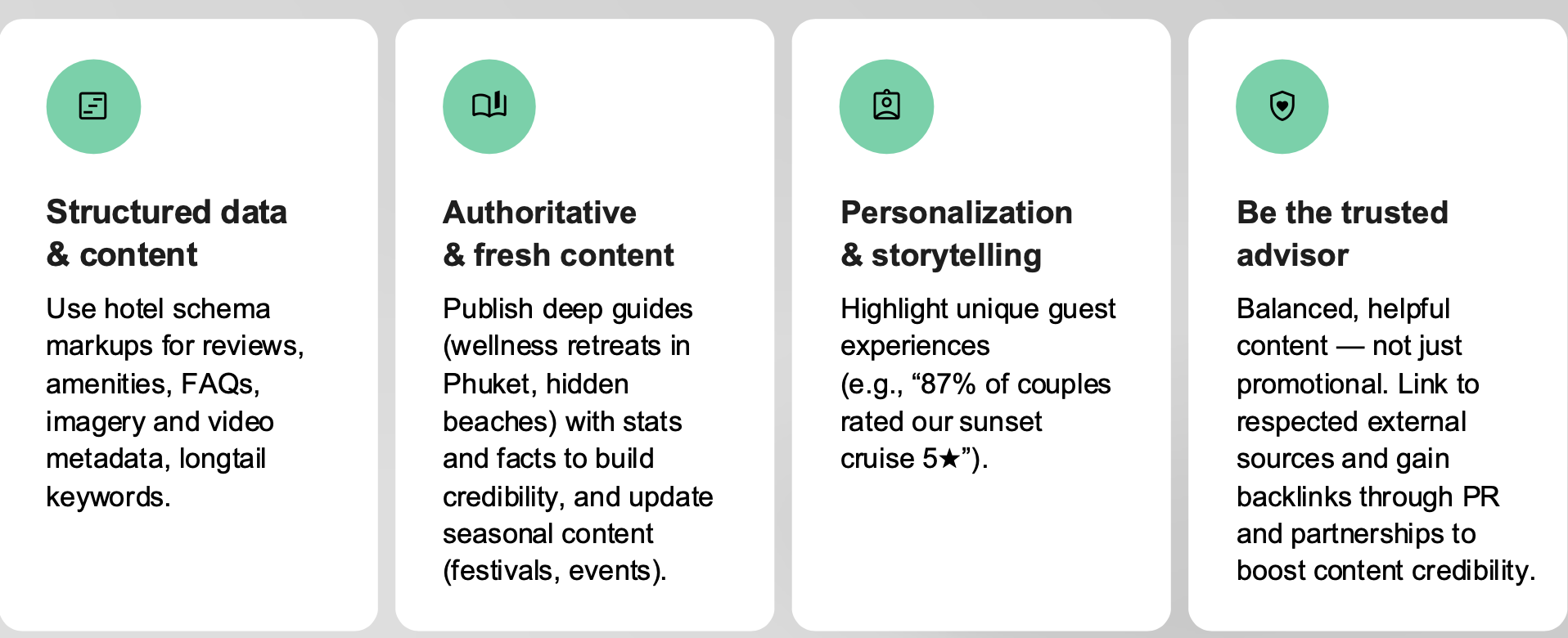Two weeks ago, at the HSMAI Resort Marketing Conference held at M Social Phuket, one session captured the attention of every hotelier in the room.
Javier Cuevas, Senior Director of Sales APAC at Cendyn, outlined a digital transformation already reshaping our industry — the move from SEO (Search Engine Optimization) to GEO (Generative Engine Optimization).
This shift isn’t a trend. It’s a structural change in how hotels will be discovered, described, and recommended in an AI-driven world.
From Search to Discovery
In the past, hotel marketers lived by keywords and backlinks. The goal was simple — appear on page one of Google.
But that model is rapidly being disrupted by AI-driven platforms such as ChatGPT, Gemini, and Perplexity, which process natural, conversational questions rather than short, keyword-based searches.
Instead of typing “best hotels in Phuket with sea view,” travelers now ask:
“I’m looking for a beachfront resort in Phuket that’s great for kids, has a spa, and is close to local restaurants — any recommendations?”
These long, contextual prompts are analyzed by Large Language Models (LLMs) that interpret intent, summarize content across multiple sources, and often display just one or two authoritative results.
That means if your hotel isn’t optimized for GEO, you might disappear from digital discovery altogether.
What GEO Really Means
Generative Engine Optimization focuses on making sure a hotel’s information is understood, trusted, and selected by AI models.
While traditional SEO relied on structure and backlinks, GEO requires clarity, credibility, and conversational tone.
As Javier Cuevas explained during the HSMAI panel, “AI doesn’t just index your website, it interprets your story. Hotels need to make sure that story is accurate, trustworthy, and emotionally relevant.”
To achieve this, hotels must:
-
Create AI-friendly FAQ pages that answer traveler questions in natural language.
-
Use structured data and consistent facts across all platforms (website, Google Business, OTAs, media).
-
Focus on storytelling. Ensuring your digital content reflects your brand’s true personality, not just its amenities.
PR and Storytelling Take Center Stage
One of the most striking points from Cuevas’ talk was the rise of PR as the new SEO.
AI models like ChatGPT often cite trusted sources. Think reputable news sites, travel blogs, and well-established digital publications, rather than just a hotel’s own website.
That means your brand mentions in authoritative media may carry more weight than your meta tags ever did.
Hotels must therefore invest in digital PR, local partnerships, and credible storytelling, ensuring that their property is featured where AI engines are looking for context.
Action Steps for Hotels Preparing for GEO
Here’s how hoteliers can start embracing the new reality of digital discovery:
-
Audit your online presence
Ensure your content is accurate, consistent, and easy for AI crawlers to understand.
FAQs, room descriptions, and “About Us” sections should read naturally, not like keyword lists. -
Adopt a conversational tone
Think in traveler questions and human answers. AI values language that mimics real intent. -
Expand visibility beyond your website
Strengthen relationships with local media, destination sites, and travel influencers, GEO rewards credibility and authenticity. -
Preserve your brand voice
Make sure your storytelling remains true to your brand. Facts inform AI, but emotion connects travelers.
The Path Ahead
GEO doesn’t replace SEO — it evolves it. The future of hotel marketing lies in understanding how AI interprets trust.
As hoteliers, marketers, and technologists, we must recognize that visibility will no longer be about ranking, it will be about relevance.
At HMS Thailand, we’re already adapting our digital strategies and training our hotel partners to thrive in this generative AI landscape. The takeaway is clear:
Search is becoming a conversation — and your story needs to be part of it.






